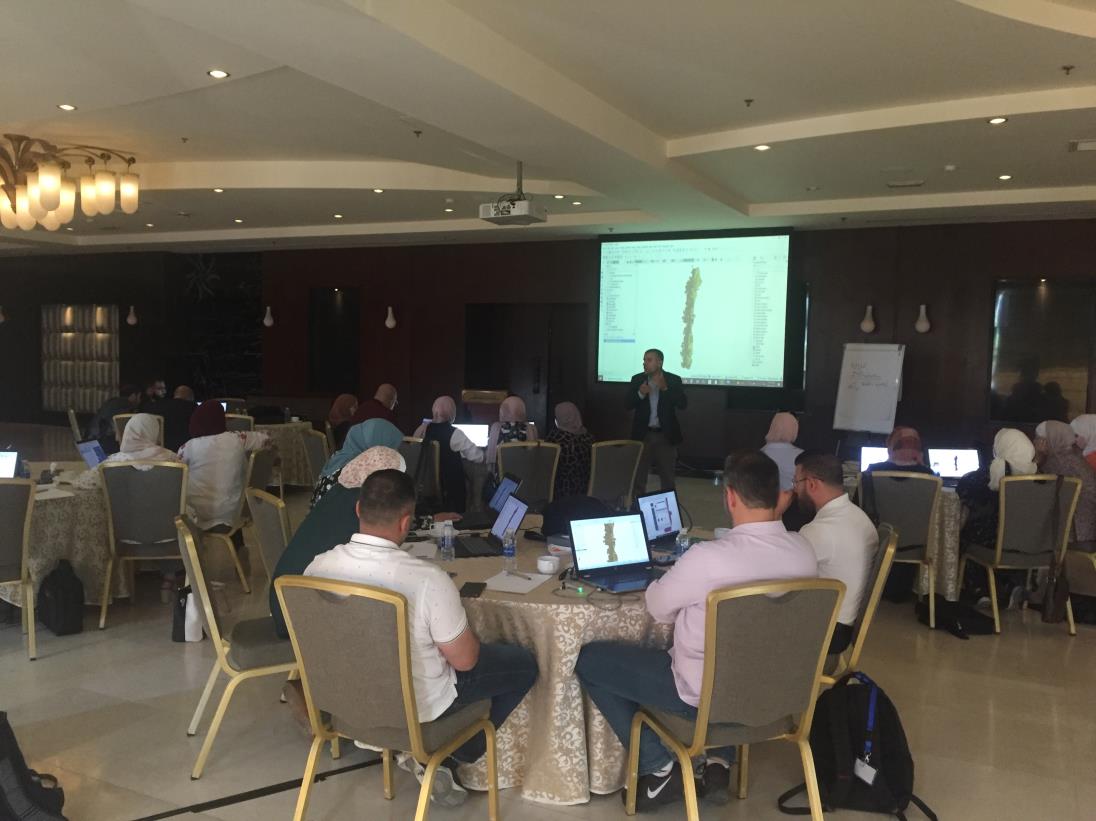FAO implements the final advanced water accounting training in Jordan

June 2022_Within the context of the Water Efficiency, Productivity and Sustainability regional project activities in Jordan and as a follow up of the previous online and physical trainings on water accounting, the Food and Agriculture Organization of the United Nations (FAO), implemented a three-day physical training between 26 and 28 June 2022 in Jordan. Twenty-Seven trainees from several national ministries/institutes under the title of advanced water accounting attended the training. The overall objective of the training was to provide trainees with background and full procedures of advanced water accounting for irrigated areas, taking north Jordan Valley as an example.
The training sessions included technicians, researchers and decision makers from the Ministry of Water and Irrigation (MWI), Water Authority (WA), Jordan Valley Authority (JVA), Ministry of Agriculture (MOA), National Agricultural Research Center (NARC), The Royal Jordanian Geographic Center (RJGC), Department of Statistics (DOS), NGOs GIS experts from The Royal Society for Conservation of Nature (RSCN), and Academia and other institutions involved in water resources management.
The training sessions achieved the following outputs and objectives:
- Enabled participants to perform advanced water accounting (WA) that could be used as a tool for water reporting and analysis.
- Provided participants with knowledge on data and type of analysis needed to perform water accounting in general and agricultural water accounting in particular.
- Assessed the levels of uncertainty in data and their impacts on outputs from WA.
- Performed the set of procedures deployed in WA, including the calculations of key performance indicators needed for assessment of water supply, demand and use.
The training was designed and implemented to enable participants to conduct the advanced water accounting using remote sensing data, the open source data of FAO WaPOR, QGIS and water accounting plus (WA+) sheets and scripts. The participants were taken through the detailed steps followed in water accounting using the combined approach of flow and depletion. The methodology of water accounting was explained including the preparation of data, calculations of inflows, outflows, filling WA+ sheets and calculation of key performance indicators (KPIs). To achieve the training objectives and ensure an active learning for all participants, interactive sessions were offered through PowerPoint presentations that included detailed steps and procedures to follow in the exercises, group discussions, live demonstrations, step-by-step exercises using GIS layers and ground data.
Within the training, short lectures were included that explain the data and the method of analysis, followed by practical sessions (exercises) carried out by trainees under the supervision of the trainer. Results and outputs were then shared and discussed among the trainees.
The participants largely expressed a high demand for capacity strengthening in terms of in-depth training on water accounting analysis and therefore, they were keen to discuss each step followed in water accounting and in calculations of inflows, outflows and KPIs. As representatives for stakeholders from different institutions, trainees were particularly interested in an in-depth evaluation of sources of land use data, precipitation and WaPOR AETI data. The majority of the trainees expressed that they gained new knowledge in WA and the use of WA+ system, as well as WaPOR and open source data in WA. An online overall course evaluation questionnaire was filled by participants to assess the level of knowledge gained and the contribution of WA training to their work in water management. Participants completed the online course evaluation questionnaire for the training as a whole and for WA datasets, approach and data analysis. Evaluation results of the training and the trainers by participants showed an overall positive feedback.
This activity is implemented under the regional project “Implementing the 2030 Agenda for water efficiency/productivity and water sustainability in NENA countries” directly under the Regional Water Scarcity Initiative. This project is funded by the Swedish International Development Cooperation Agency.
